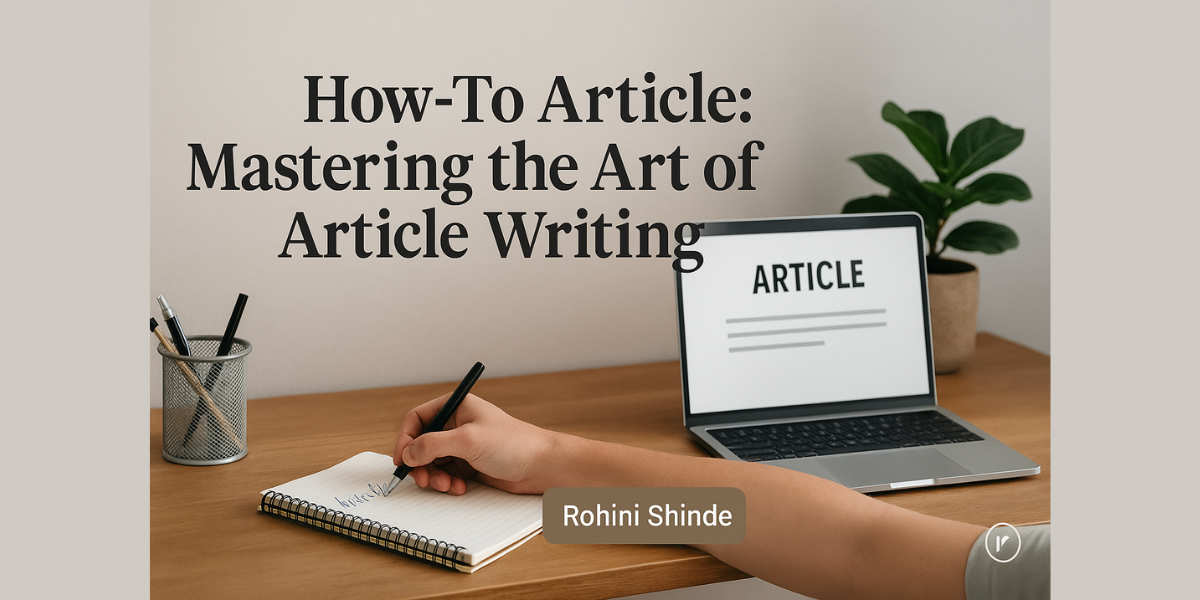How to Master the Art of Article Writing | A Step-by-Step Guide for Beginners & Professionals
Writing Articles Is More Than Just Writing—It’s Structuring, Connecting, and Impacting
In today’s digital landscape, article writing is the backbone of blogging, content marketing, thought leadership, and SEO. Whether you’re crafting informative posts, persuasive narratives, or brand-driven editorials, knowing how to write an effective article is a skill that will never go out of style.
But mastering article writing isn’t about following a formula—it’s about balancing creativity with clarity, and strategy with storytelling. Whether you’re a student, content creator, or aspiring professional, this guide walks you through how to write compelling articles that inform, engage, and convert.
What Is Article Writing?
Article writing is the process of creating a structured, informative, and purposeful piece of content on a specific topic for a defined audience. It typically includes:
-
A strong headline
-
An engaging introduction
-
A well-organized body
-
Supporting evidence or data
-
A clear conclusion or takeaway
From blogs and magazines to corporate websites and academic journals, article writing adapts to its platform, audience, and goal.
Why Learn the Art of Article Writing?
✍️ 1. It Enhances Communication Skills
Article writing trains you to express complex ideas with clarity and structure.
💻 2. It Supports SEO and Digital Visibility
Well-written articles help businesses rank on Google and attract organic traffic.
🧠 3. It Builds Thought Leadership
Regular publishing positions you as an authority in your field—whether it’s marketing, tech, education, or wellness.
🗣️ 4. It Strengthens Personal or Brand Voice
Articles allow you to build a unique style that connects with your audience on a deeper level.
Step-by-Step: How to Master Article Writing
✅ Step 1: Understand Your Purpose and Audience
Ask yourself:
-
Who are you writing for?
-
What value are you providing?
-
Is the tone formal, casual, or conversational?
Pro Tip:
A blog for Gen Z readers on “productivity hacks” will read very differently than a whitepaper for CFOs on “cost optimization.”
✅ Step 2: Choose a Clear, Impactful Topic
Great articles begin with great ideas. Your topic should be:
-
Specific (not “Marketing,” but “Email Marketing for SaaS Startups”)
-
Timely and relevant
-
Supported by enough data or content to explore meaningfully
Use tools like:
-
Google Trends
-
AnswerThePublic
-
SEMrush/Ahrefs (for keyword-based topics)
✅ Step 3: Write a Strong, Search-Optimized Headline
Your headline determines whether people click. Aim for clarity + curiosity.
Types of Headlines:
-
How-To: “How to Write SEO Articles That Rank”
-
Listicle: “7 Tips for Writing Better Articles”
-
Question: “What Makes an Article Worth Reading?”
-
Command: “Master the Art of Blog Writing Today”
✅ Step 4: Craft an Engaging Introduction
The first paragraph must:
-
Hook the reader
-
Introduce the problem
-
Tease the solution or benefit of reading further
Avoid:
Generic phrases like “In this article, we will discuss…”
Use:
Real-world examples, stats, or a thought-provoking question.
✅ Step 5: Structure the Body Logically
Use subheadings (<h2>/<h3>) to organize ideas. Break content into digestible sections such as:
-
Explanation or background
-
Steps or methods
-
Examples or case studies
-
Expert insights or quotes
-
Pros and cons (if applicable)
Pro Tip:
Use bullet points, bolding, and white space for visual clarity and better UX.
✅ Step 6: Add Value with Facts, Examples & Links
Authority comes from evidence. Link to:
-
Credible sources (studies, reports, expert sites)
-
Internal content (to improve SEO and engagement)
-
Related tools or resources
Example:
Instead of saying “this works,” show how it worked with real metrics or user feedback.
✅ Step 7: Conclude with Impact
Wrap up by:
-
Reinforcing your main message
-
Encouraging the reader to take action
-
Asking a question to invite engagement
-
Suggesting related reading or resources
Tips for Better Article Writing
✨ Keep It Simple, Not Basic
Use clear language, but don’t dumb it down. Assume intelligence, not expertise.
✨ Write Like You Speak
Conversational tones improve readability—especially online.
✨ Edit Ruthlessly
Great writing is rewriting. Use Grammarly or Hemingway App, or better, a real editor.
✨ Avoid Plagiarism
Always cite sources and create original arguments or phrasing.
✨ Optimize for SEO
Use keywords naturally, structure your content with headers, and don’t forget meta descriptions.
Formats & Types of Articles You Can Explore
| Type | Best For |
|---|---|
| How-To Guides | Tutorials, skill-building, walkthroughs |
| Listicles | Engagement, social sharing, readability |
| Opinion/Editorials | Thought leadership, brand positioning |
| News or Commentary | Timely updates, reactions to industry shifts |
| Case Studies | Building trust, showcasing results |
| Educational Articles | Teaching or breaking down complex subjects |
FAQs – Mastering Article Writing
❓How long should an article be?
A typical blog article ranges from 800–1600 words. Long-form pieces can go beyond 2500 words if they offer deep insights.
❓How do I know if my article is good?
Check for readability, clarity, SEO structure, and whether it solves a problem or provides value to your audience.
❓Can I use AI to write articles?
AI can assist with drafts or outlines, but a human writer ensures originality, tone, and engagement that AI can’t match.
❓Should I include images or media?
Yes! Supporting visuals like charts, infographics, and embedded videos increase retention and shareability.
Final Words
Article writing is a craft—and like any craft, it’s part skill, part strategy, and part storytelling. When done well, articles don’t just fill space—they fill minds, rank high, and drive action. Whether you’re writing for SEO, brand building, or education, mastering the art of article writing will set you apart in any digital field.
At Rohini Shinde Content Studio, we help brands, marketers, and founders bring clarity to their ideas through professionally written, SEO-friendly, and 100% original articles.
👉 Want help writing articles that inform, engage, and rank?
Explore Expert Article Writing Services

